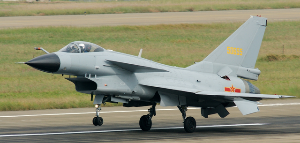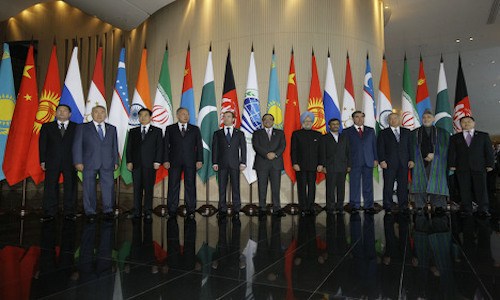SCO Military Drills Strengthen Russian-Chinese Regional Hegemony
By Richard Weitz (10/01/2014 issue of the CACI Analyst)
On August 24-29, the Shanghai Cooperation Organization (SCO) held its largest multinational exercise in history, Peace Mission 2014. The declared objective of the joint drills is to help the SCO member governments deter and, if necessary, defeat potential terrorist threats. But the exercises also allow Russia and China to communicate to the SCO and other parties, especially the U.S., that Moscow and Beijing have a genuine security partnership and that it extends to cover Central Asia.

Shanghai Cooperation Challenges the West
By Oleg Salimov (09/17/2014 issue of the CACI Analyst)
Tajikistan’s capital Dushanbe hosted the Shanghai Cooperation Organization (SCO) summit for two days on September 11-12. The summit concluded Tajikistan’s position in the organization’s rotating chairmanship and handed the duty over to the Russian Federation. The summit was attended by six member states, China, Kazakhstan, Kyrgyzstan, Russia, Tajikistan, and Uzbekistan, and the five observers Afghanistan, India, Iran, Mongolia, and Pakistan. Turkmenistan’s President Gurbanguly Berdimuhammedov attended the summit as a distinguished guest. Economic cooperation and threats to regional security through political instability in Afghanistan, the Middle East, North Africa, and Ukraine were established as the summit’s agenda. The long awaited expansion of the organization by adding India, Pakistan, and possibly Iran as new members became one of the most important announcements of the summit, outlining the SCO’s projects for the upcoming year.
The expansion plans were revealed on the eve of the summit by Russia’s Foreign Minister Sergey Lavrov in the Russian media outlet Rossiyskaya Gazeta. The article referred to Pakistan, India, and Iran as new prospective members of the SCO. Iran has previously applied twice for SCO membership but the outcomes of Iran joining it are highly ambiguous considering the country’s frictions with Israel and the U.S. over its nuclear program. Russia’s recently intensified conflict with Western countries draws it closer to Iran and raises Iran’s hopes for full membership in the SCO. The question remains, however, whether the SCO will be able to manage the regional rivalry between China, India, and Pakistan if the prospective members are in fact accepted.
Lavrov also stressed the potential of using national currencies in financial operations among SCO’s members. The statement is a continuation of Russia’s political initiatives aimed at relinquishing euros and dollars in its financial operations in the wake of the U.S. and EU economic sanctions imposed on Russia for its role in Ukrainian crisis. Earlier, Russia and China, the two major players of SCO, have declared their intention of national currencies turnover in the recently started natural gas delivery project. It is only logical for Russia to employ the SCO’s chairmanship and natural resources leverage to expand the organization through India, Pakistan, and Iran and to denounce euros and dollars when refocusing from Europe to Asia.
The SCO’s memorandum declared several particular steps towards the promotion of national currencies in SCO’s financial system and, as a result, the alienation of euros and dollars. These include increasing members’ financial and banking cooperation in regional trade and economy, and an intensification of efforts in establishing their own Development Fund and Bank of Development. However, it should be noted that the idea of establishing financial institutions within the SCO, such as a Development Fund, was first proposed in 2011 by Kazakhstan and widely supported by Russia as a response to the global financial crisis. At the same time, China offered its own project in the SCO’s Bank of Development. Both were viewed as security measures for the SCO’s members. Russia’s current growing confrontation of with the West amplifies the likelihood that the proposed SCO financial institutions will be implemented.
The SCO’s own financial institutions are also in agreement with Russia’s intent to develop regional automobile transportation infrastructure which will connect Asia with Russia’s Siberia region. The infrastructure linking Asia and Siberia can serve to accelerate regional trade in addition to the Trans-Siberian railroad. Vladimir Putin announced the intent during the previous SCO summit in Bishkek in September 2013, and Lavrov also highlighted the transportation projects as a major SCO interest in his article on SCO expansion. In the Bishkek summit, the SCO’s Interbanking association was seen as the major prospective investor of the project. In light of the latest proposals, if realized, the SCO’s Bank of Development might become a subsequent proprietor of the Asia-Siberia transportation project.
The SCO summit in Dushanbe demonstrated a growing division between the developing and developed worlds in Eurasia. The signs of division can be seen in the summit’s official declaration, the statements of the officials, and the SCO’s narrowing scope of priorities. The SCO unifies a group of regimes that pursue various objectives through a common need for political and economic survival. For example, stated in the summit’s declaration, the determination to establish informational security and fend off informational-communication threats improve the survivability of authoritarian regimes like Tajikistan and Uzbekistan. For Russia and Iran, the SCO is an engine for forging political alliances and economic partnerships. The emerging Asian countries are attracted to the SCO by the opportunity of obtaining cheap energy resources. The cumulative efforts of these countries can create a serious counterbalance to the West.
Central Asian Republics Participate in SCO Drills in China
By Oleg Salimov (08/14/2014 issue of the CACI Analyst)
The Central Asian countries are taking part in an antiterrorist exercise in China’s Inner Mongolia Autonomous region. The military training ground “Zhurihe” in the administrative district Hohhot will host military personnel from Kazakhstan, Kyrgyzstan, Tajikistan, and Russia, arriving to conduct antiterrorist exercises code-named “Peaceful Mission – 2014.” The military drills are planned for August 24-29, 2014 as part of “The prospects of cooperation between Ministries of Defense of Shanghai Cooperation Organization members for 2014-2015 years.”
The military exercise in the autonomous region historically inhabited by ethnic Mongols and with close proximity to the restive Xinjiang indicates the Chinese government’s anxiety over the spread of separatist ideas in the Northwestern part of the country. In particular, when announcing the joint antiterrorist exercise during a press conference on June 26, a representative of China’s Ministry of Defense, Yan Yuizun, declared that the drills are aimed at preventing and controlling terrorism, extremism, and separatism as the main evils of the modern world.
The total number of servicemen taking part in the military drills reaches 7,000. They mostly arrive to China and concentrate in the city of Kashgar, a hotbed of Uighur rebellion and frequent bloodshed. While Beijing risks unnecessary provocations if it conducts military drills in the heart of the Uighur region, it certainly sends out a strong message by selecting Kashgar as a transit and logistic hub for foreign military units. The concentrated grouping of heavily armed military forces and equipment serves the purpose of intimidating the local Uighur population and at the same time assures the Han Chinese population, a frequent target of attacks by Uighur militants, of the central government’s ability to protect them.
Also, the Inner Mongolia Autonomous Region, termed Southern Mongolia by local opposition activists, was deliberately selected for the antiterrorist exercise. Official Beijing is interested in conducting war games in a region with a historical and ethnical inclination towards mainland Mongolia as a continuation of its absorption policy and demonstration of power. Inner Mongolia was a site of violent clashes with police and the Chinese army in May 2011, as reported by Amnesty International and other human rights organizations in the region. The increased coal exploration in Inner Mongolia led to unexpected unrest among mostly cattle-breading inhabitants in an otherwise politically submissive territory.
Central Asian republics arrive to the military drills with a baggage of their own. Currently, the most strenuous relationship in the SCO’s present antiterrorist exercise is that between Tajikistan and Kyrgyzstan. For these republics, the joint exercise is complicated by the recent territorial disputes which involve continuous shoot-outs, casualties, mutual accusations, and inability to reach a border demarcation compromise. Only a few days before sending their troops to China, Tajikistan and Kyrgyzstan had yet another incident of lethal crossfire at the border with one Kyrgyz citizen killed and two arrested by a Tajik border patrol. Negotiations over the status of the Vorukh enclave in Kyrgyzstan, populated by ethnic Tajiks and a place of frequent ethnic clashes, are also stalled as the sides are unable to agree on the details of transportation communications between Vorukh and Tajikistan. Experiencing low-brewing separatist moods due to ethnical compositions and mutual territorial claims, the two republics enter the antiterrorist exercise with conflicting objectives mutual disaffection.
While sending its military units to China, Kazakhstan hosts military drills of the Collective Security Treaty Organization (CSTO) code-named “Interaction – 2014” on August 18-22 at the military training ground “Spassk,” involving up to 3,000 servicemen, 200 units of heavy armored vehicles and equipment, and 30 air force units. Russia, Tajikistan, and Kyrgyzstan also participate in the CSTO military drills alongside the SCO’s antiterrorist exercise. The purpose of this exercise is to practice an efficient response to external threats against CSTO members. As observed, SCO and CSTO have considerably increased their military activity in light of recent international tensions over Ukraine and the Middle East.
The latest large-scale SCO antiterrorist exercises, “Peaceful Mission – 2012,” took place in Tajikistan’s “Chorukhdaron” military training ground in June 2012. Notably, Uzbekistan an SCO member, refrained from participating in previous and current “Peaceful Mission” exercises providing no explanations. At the same time, Uzbekistan conducted a similar yet smaller antiterrorist exercise with Kyrgyzstan in March 2014, coordination by SCO’s executive committee.
For Beijing, the antiterrorist exercise is an important means for demonstrating to its subjects, such as Uighurs and ethnic Mongols, its ability to maintain and enforce territorial integrity, subordination, and order. Aside from the improvement of the People’s Liberation Army’s professional skills, the large-scale exercise aims to maintain its control over the general Chinese population by demonstrating power and military might.
Shanghai Cooperation Organization Set to Expand
By John C.K. Daly (08/14/2014 issue of the CACI Analyst)
The Shanghai Cooperation Organization (SCO) currently consists of China, Kazakhstan, Kyrgyzstan, Russia, Tajikistan and Uzbekistan. At an August 1 meeting in the Tajik capital Dushanbe, foreign ministers from the six member states reached consensus on legal documents providing for expanding the SCO to include four current SCO observer states, India, Pakistan, Iran and Mongolia, passing two draft documents on expansion for approval at the SCO summit to be held in Dushanbe September 11-12. If passed, it will be the largest expansion of the SCO since its founding.





